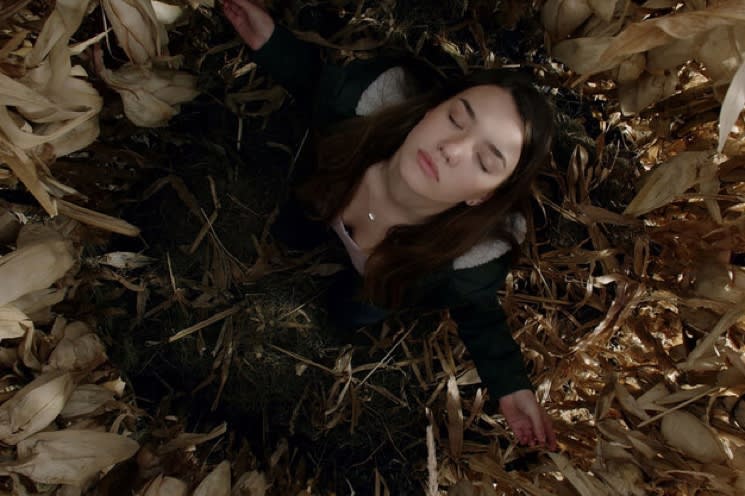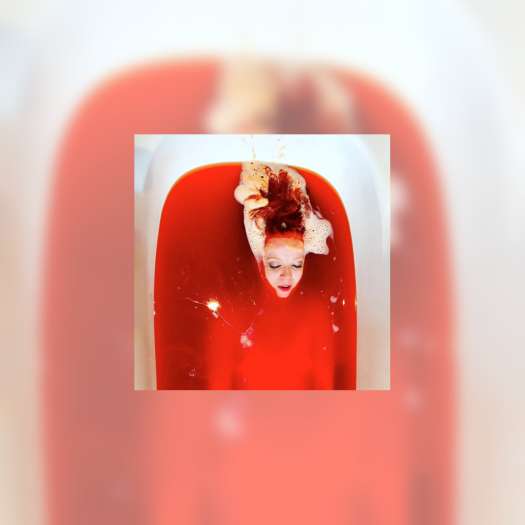There is no genre better suited to making explicit all the ways in which we destroy teenage girls than horror. And when you add some religion to that equation you not only make things more interesting, you also prompt existential dread. Horror is, after all, how we face our anxieties and thereby expel them. The Corruption of Divine Providence is such a film, but it's also on another level. Not so much a continuation of the tradition firmly set by 1973's The Exorcist as it is a reinvention of this type of movie, The Corruption of Divine Providence is an endlessly horrific and gleamingly hopeful look at human frailty in all its grotesque forms.
The first 10 minutes of this movie (written and directed by Jeremy Torrie) are a wild ride. In St. Michel, MB, a farming town of fewer than 1,000 people, 15-year-old Jeanne Séraphin (Ali Skovbye) awakens in a pool of her own blood, her hands and feet marked with stigmata, her forehead bleeding as if from the weight of a thorny crown. The community is intensely Catholic and everyone is convinced Jeanne is a stigmatic — everyone could use a miracle. Jeanne's father Luis (David La Haye), a Métis bar owner full of self-loathing, begins exploiting Jeanne's mysterious condition for gain. Jeanne's mother Danielle (Elyse Levesque) becomes increasingly skeptical of her faith and repelled by Luis. All this happens within the first act, and the subsequent moments flesh out the story of a violently broken marriage, a troubled and neglected girl, and a hypocritical community. In addition to the procession of townspeople who line up outside of Jeanne's hospital room to worship her, Dakota elders come to offer her gifts, and a Texan Pentecostal preacher comes to broadcast Jeanne's situation to the world.
Luis is perhaps the film's most mesmerizing character. He grew up in an environment that taught him to hate his identity as a Métis person, and as an adult he is a devout Catholic and an alcoholic, and he illegally provides booze to a neighbouring Indigenous reserve. But the thing is, La Haye is the spitting image of the Jesus Luis's church worships, and Torrie uses this to his advantage. Time and again, Luis's moral bankruptcy and toxic masculinity are juxtaposed with his Jesus-like appearance, and with how devout he is in his worship. There is a wonderful scene that sees him going to the community church and asking the father if the church is willing to out-bid the Texan preacher for access to Jeanne. Torrie and La Haye have you simultaneously despising and sympathizing with Luis; he is terrifying one moment, as he shoots the family dog and pockets money from the townspeople, but tragic the next, as he poignantly describes his abusive upbringing and the biases against Métis people.
Danielle likewise is a complex, troubled character who is desperately searching for meaning in a life she deeply regrets. She works in a cafe and tends fanatically to her garden, and she can't remember the last time she saw Luis completely sober. Both husband and wife are good and vile — human. When they fight, you can feel their ire; Levesque's hatred of Luis radiates off her as she shirks away from his touch, and she screams words at him that have been locked up in her for years. Luis is full of resentment and lust, which is palpable as he looks down upon her, his gaze oily and drunk. La Haye and Levesque are amazing to watch, real in a way that makes you wonder whether they're on the other side of your walls.
When teenage girls get haunted in movies — by demons, vampires (Jennifer's Body) or werewolves (Ginger Snaps) — it's often a metaphor for puberty or an adult's fear of their budding sexuality. With Jeanne's possession, though, Torrie interrogates a kind of silently traumatic sadness that it's impossible to talk about without spoiling the movie. He handles the matter with care, deftly showing us how families and communities can wreak havoc by misunderstanding and underestimating girls. Through Jeanne's character, Torrie explores the idea of false prophets and salvation in face of sinfulness. Everyone, including Luis, flocks to a profusely bleeding Jeanne when they think she might be a saint, ignoring all her wild questions and fears, all her pain, taking her mental wellbeing for granted.
The film's brooding cinematography (Eric Cayla) gives its action a choked urgency. Manitoba's rolling planes become sun-scorched in Cayla's hands, so much so they look as though they're blood-soaked. That being said, the story's pacing is a bit off. While it's only about 90 minutes in length, it seems longer, as though it would be better suited to a miniseries than a feature.
Nonetheless, with The Corruption of Divine Providence, Torrie has given us a meandering yet hopeful horror film. This movie is at times devilishly campy in the manner of The Devil's Advocate, and will reward with multiple rewatches. The entire lens through which it's told is so refreshing and deeply Canadian that it holds up admirably in the canon of horror films about teenage girls.
The Corruption of Divine Providence is out on VOD on May 25.
(White Bear Films)The first 10 minutes of this movie (written and directed by Jeremy Torrie) are a wild ride. In St. Michel, MB, a farming town of fewer than 1,000 people, 15-year-old Jeanne Séraphin (Ali Skovbye) awakens in a pool of her own blood, her hands and feet marked with stigmata, her forehead bleeding as if from the weight of a thorny crown. The community is intensely Catholic and everyone is convinced Jeanne is a stigmatic — everyone could use a miracle. Jeanne's father Luis (David La Haye), a Métis bar owner full of self-loathing, begins exploiting Jeanne's mysterious condition for gain. Jeanne's mother Danielle (Elyse Levesque) becomes increasingly skeptical of her faith and repelled by Luis. All this happens within the first act, and the subsequent moments flesh out the story of a violently broken marriage, a troubled and neglected girl, and a hypocritical community. In addition to the procession of townspeople who line up outside of Jeanne's hospital room to worship her, Dakota elders come to offer her gifts, and a Texan Pentecostal preacher comes to broadcast Jeanne's situation to the world.
Luis is perhaps the film's most mesmerizing character. He grew up in an environment that taught him to hate his identity as a Métis person, and as an adult he is a devout Catholic and an alcoholic, and he illegally provides booze to a neighbouring Indigenous reserve. But the thing is, La Haye is the spitting image of the Jesus Luis's church worships, and Torrie uses this to his advantage. Time and again, Luis's moral bankruptcy and toxic masculinity are juxtaposed with his Jesus-like appearance, and with how devout he is in his worship. There is a wonderful scene that sees him going to the community church and asking the father if the church is willing to out-bid the Texan preacher for access to Jeanne. Torrie and La Haye have you simultaneously despising and sympathizing with Luis; he is terrifying one moment, as he shoots the family dog and pockets money from the townspeople, but tragic the next, as he poignantly describes his abusive upbringing and the biases against Métis people.
Danielle likewise is a complex, troubled character who is desperately searching for meaning in a life she deeply regrets. She works in a cafe and tends fanatically to her garden, and she can't remember the last time she saw Luis completely sober. Both husband and wife are good and vile — human. When they fight, you can feel their ire; Levesque's hatred of Luis radiates off her as she shirks away from his touch, and she screams words at him that have been locked up in her for years. Luis is full of resentment and lust, which is palpable as he looks down upon her, his gaze oily and drunk. La Haye and Levesque are amazing to watch, real in a way that makes you wonder whether they're on the other side of your walls.
When teenage girls get haunted in movies — by demons, vampires (Jennifer's Body) or werewolves (Ginger Snaps) — it's often a metaphor for puberty or an adult's fear of their budding sexuality. With Jeanne's possession, though, Torrie interrogates a kind of silently traumatic sadness that it's impossible to talk about without spoiling the movie. He handles the matter with care, deftly showing us how families and communities can wreak havoc by misunderstanding and underestimating girls. Through Jeanne's character, Torrie explores the idea of false prophets and salvation in face of sinfulness. Everyone, including Luis, flocks to a profusely bleeding Jeanne when they think she might be a saint, ignoring all her wild questions and fears, all her pain, taking her mental wellbeing for granted.
The film's brooding cinematography (Eric Cayla) gives its action a choked urgency. Manitoba's rolling planes become sun-scorched in Cayla's hands, so much so they look as though they're blood-soaked. That being said, the story's pacing is a bit off. While it's only about 90 minutes in length, it seems longer, as though it would be better suited to a miniseries than a feature.
Nonetheless, with The Corruption of Divine Providence, Torrie has given us a meandering yet hopeful horror film. This movie is at times devilishly campy in the manner of The Devil's Advocate, and will reward with multiple rewatches. The entire lens through which it's told is so refreshing and deeply Canadian that it holds up admirably in the canon of horror films about teenage girls.
The Corruption of Divine Providence is out on VOD on May 25.




